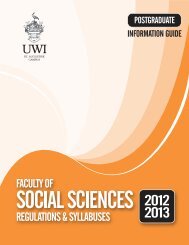Faculty of Humanities and Education (Postgraduate) - The University ...
Faculty of Humanities and Education (Postgraduate) - The University ...
Faculty of Humanities and Education (Postgraduate) - The University ...
You also want an ePaper? Increase the reach of your titles
YUMPU automatically turns print PDFs into web optimized ePapers that Google loves.
64<br />
POSTGRADUATE REGULATIONS & SYLLABUSES 2012 - 2013<br />
THE FACULTY OF HUMANITIES & EDUCATION<br />
C. Adolescents <strong>and</strong> school: Responding to needs in the<br />
classroom<br />
• Responsive curriculum<br />
• Starting where the young people are<br />
• Making the curriculum relevant to needs <strong>and</strong><br />
real-life situations<br />
• Using empowering classroom methodologies<br />
• Incorporating life skills (rehearsal <strong>and</strong> practice for<br />
behaviour change)<br />
• Creating a safe learning environment<br />
• Psychosocial (emotionally safe; conducive to risk<br />
taking, etc.)<br />
• Connecting with students<br />
• Multiple intelligences<br />
• Inclusiveness<br />
• Differentiation<br />
• Gender issues<br />
D. Adolescents in community : Creating a supportive<br />
whole-school environment<br />
• A whole-school approach: Facilitating change<br />
• Simple framework: curriculum, teaching <strong>and</strong><br />
learning; school organisation, ethos, <strong>and</strong><br />
environment; <strong>and</strong> partnerships<br />
• Teachers as change agents<br />
• Creating a safe <strong>and</strong> supportive physical environment<br />
• Some factors that support social, emotional, <strong>and</strong><br />
academic learning<br />
• Supportive relationships at all levels<br />
• Participation (democratic; open communication,<br />
etc.)<br />
Goals/Aims<br />
<strong>The</strong> course uses a three-pronged approach that aims to provide<br />
participants with the knowledge<br />
<strong>and</strong> skills to:<br />
1. develop <strong>and</strong> model behaviours that promote <strong>and</strong><br />
support a whole child/adolescent approach to learning;<br />
2. address the needs <strong>of</strong> the adolescent learner in a holistic<br />
manner; <strong>and</strong><br />
3. become change agents in the creation <strong>of</strong> whole-school<br />
environments that challenge <strong>and</strong> support the needs <strong>of</strong> all<br />
members.<br />
General Objectives<br />
In order to achieve the course goals, the participants will:<br />
• acquire the knowledge <strong>and</strong> tools to assess <strong>and</strong> promote<br />
their own health <strong>and</strong> well-being;<br />
• use their knowledge <strong>and</strong> skills to identify <strong>and</strong> address the<br />
intellectual, emotional, <strong>and</strong> social needs <strong>of</strong> the adolescent<br />
learner; <strong>and</strong><br />
• develop skills to promote a whole school approach to<br />
address the needs <strong>of</strong> the entire learning community.<br />
Assessment<br />
Purpose <strong>of</strong> Assessment<br />
<strong>The</strong> assessment tasks are designed with foci on assessment<br />
for learning <strong>and</strong> assessment <strong>of</strong> learning, <strong>and</strong> will provide the<br />
necessary scaffolding to support the participant in achieving<br />
the learning outcomes <strong>of</strong> the course.<br />
<strong>The</strong> assessment method s<br />
<strong>The</strong>se include a blend <strong>of</strong> traditional as well as online activities,<br />
enabling the participants to use <strong>and</strong> become familiar with some<br />
<strong>of</strong> the available technologies. <strong>The</strong>se include class presentations<br />
using a variety <strong>of</strong> media, <strong>and</strong> an electronic portfolio.<br />
Assignments<br />
100% coursework. Assignments over the duration <strong>of</strong> the course<br />
will contribute to a cumulative mark.<br />
Required readings<br />
Armstrong, T. (2000). Multiple intelligences in the classroom<br />
(2 nd ed.). Alex<strong>and</strong>ria, VA: Association for Supervision <strong>and</strong><br />
Curriculum Development.<br />
Gardner, H. (1993). Multiple intelligences: <strong>The</strong> theory in practice: A<br />
reader. New York, NY: Basic Books.<br />
Goleman, D. (2006). Emotional intelligence (10 th anniversary ed.).<br />
New York, NY: Bantam Books.<br />
Goleman, D. (2006). Social intelligence: <strong>The</strong> new science <strong>of</strong> human<br />
r relationships. New York, NY: Bantam Books.<br />
Page, R. M., & Page, T. S. (2003). Fostering emotional well-being in<br />
the classroom. Sudbury, MA: Jones <strong>and</strong> Bartlett Pubs.<br />
Pasi, R. J. (2001). Higher expectations: Promoting social emotional<br />
learning <strong>and</strong> academic achievement in your school. New<br />
York, NY: Teachers College Press.<br />
Weare, K. (2000). Promoting mental, emotional <strong>and</strong> social health:<br />
A whole school approach. New York, NY: Routledge.<br />
Recommended readings<br />
Darling-Hammond, L., & Bransford, J. (Eds.) (2005). Preparing<br />
teachers for a changing world: What teachers should learn<br />
<strong>and</strong> be able to do. San Francisco, CA: Jossey-Bass. (See<br />
Chapter 10 How teachers learn <strong>and</strong> develop)<br />
Denton, P. (2009). <strong>The</strong> power <strong>of</strong> our words. In M. Scherer (Ed.),<br />
Supporting the whole child: Reflections on best practices<br />
in learning, teaching, <strong>and</strong> leadership (pp. 149–155).<br />
Alex<strong>and</strong>ria, VA: Association for Supervision <strong>and</strong> Curriculum<br />
Development.<br />
Levy, S. (2009). <strong>The</strong> power <strong>of</strong> audience. In M. Scherer (Ed.), Engaging<br />
the whole child: Reflections on best practices in learning,<br />
teaching, <strong>and</strong> leadership (pp. 264–276). Alex<strong>and</strong>ria, VA:<br />
Association for Supervision <strong>and</strong> Curriculum Development.<br />
Noddings, N. (2009). All our students thinking. In M. Scherer<br />
(Ed.), Engaging the whole child: Reflections on best<br />
practices in learning, teaching, <strong>and</strong> leadership (pp. 91–100).<br />
Alex<strong>and</strong>ria, VA: Association for Supervision <strong>and</strong> Curriculum<br />
Development.<br />
Prensky. M. (2009). Turning on the lights. In M. Scherer (Ed.),<br />
Engaging the whole child: Reflections on best practices<br />
in learning, teaching, <strong>and</strong> leadership (pp. 210–219).<br />
Alex<strong>and</strong>ria, VA: Association for Supervision <strong>and</strong> Curriculum<br />
Development.

















